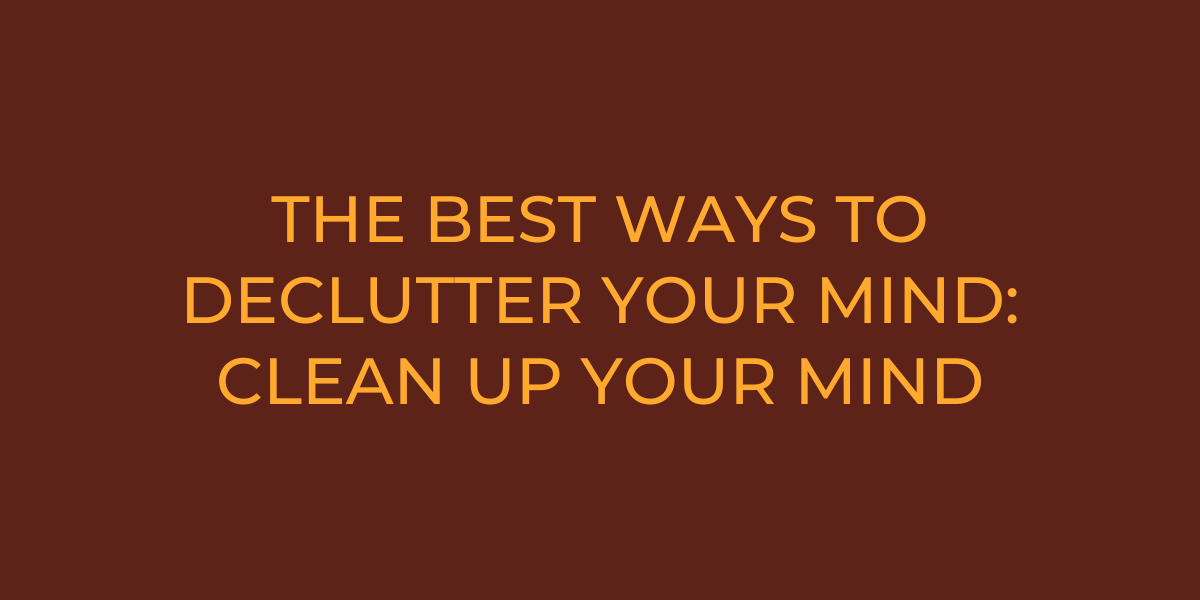Our minds frequently become overloaded with endless thoughts, worries, and distractions in today’s fast-paced society. We may experience feelings of exhaustion, worry, and disconnection from ourselves when there is constant noise and confusion.
It’s probably time to start decluttering your mind if you’ve been experiencing these feelings.
We can prioritize what is truly important to us and view life more clearly when our minds are clear. This includes spending time with loved ones and working toward personal development.
What Is Mental Clutter?
Mental clutter is an overabundance of ideas and thoughts that overload your head and make it difficult for you to concentrate or think effectively. You can go into overdrive, lose energy, and become bogged down.
Clutter can accumulate in our minds as much as the items in our homes.
Stress, worry, anxiety, pessimistic thinking, and other intrusive or undesirable ideas are all examples of this sense of having too much on your mind. It can originate from many places, including social media, your workplace, and your family. Although the study of mental clutter is still in its infancy, we know it can negatively affect our thoughts, feelings, and daily lives.
Signs That You Have A Cluttered Mind
This type of mental exhaustion might leave us feeling overwhelmed and unable to concentrate on anything. Let’s go through a short list of signs that may be telling you that you have mind clutter.
Overwhelm or Anxiety Feelings
Your emotional health can suffer when you have a cluttered mind, which frequently results in overwhelming or worried feelings. That happens when having too many things on your mind at once.
Sadness And Demotivation Feelings
Even though you might think you’re working, you might be acting passively. In completing the duty, you experience inferiority and worthlessness. When you have too many thoughts running through your head, motivation drastically declines. In the end, you fall short of producing the required results.
Difficulty to Focus
Staying focused may seem impossible when your thoughts are chaotic. That may cause inefficiency, missed deadlines, and procrastination.
Even when you may be producing results, these could not be the ideal ones. Perhaps your attention is elsewhere, so you fail to take a strong interest in trivial matters.
Traveling In The Dark
Even if you have an organized action plan and have a clear goal in mind, you could still fail to follow it because you let your mind wander far from the intended course.
You realize that you are off your intended course. You even force yourself into a trap without knowing what you are doing since you don’t help yourself grasp where you are going.
Decision-Making Feels Impossible
Making decisions might seem daunting and difficult when the mind is cluttered. You might start doubting your decisions or having trouble making a final decision.
Having all this in your mind prevents you from making the appropriate judgments, even when you are faced with an urgent circumstance where you need to act smartly. You simply allow events to unfold.
Physical Clutter
Disorganized thinking and scattered thoughts are frequently the results of cluttered minds. You might realize you misplace things, miss crucial dates, or have trouble connecting thoughts coherently.
When you are mentally and emotionally tired, your body feels tired. That is why most people experiencing mental clutter have messy rooms, messy workplaces, and cluttered spaces.
Lack Of Clarity
Without fully understanding what or why you are doing something, you simply keep doing it. Despite your skill, you act like a victim in that field when you work. In everything you think, say, and do, you lack complete focus and clarity.
Pointless Overthinking
Right now, you’re thinking a lot of different things. Even your consciousness is added to create extra flavor. You start to think more deeply than you can handle, which puts you in serious difficulties and forces you to confront health issues.
Lack Of Creativity
We all use creativity in some capacity, even if we aren’t artists or regularly engage in highly imaginative activities. A busy mind might make it difficult to be creative, which manifests as a lack of fresh ideas for your impending deadline. You’re not as quick with your thinking as you once were. Your mental sharpness isn’t what it once was.
Tiredness and Exhaustion
Constantly having thoughts in the brain can make us feel worn out. The most common time for this to happen is at night when you’re attempting to sleep, but your mind is racing while your body is trying to relax, disrupting your sleep cycles. Therefore, you aren’t sleeping. Lack of sleep leads to weariness. Therefore, you might need to organize your mind if you feel exhausted.
Why Do You Need A Mind Decluttering?
Clearing your head has several advantages. Some of the most well-known ones are the following:
Improved Emotional Health
Emotional baggage and negative thought habits are frequent components of mental congestion. Organizing your thoughts makes it easier to let go of negativity, which promotes emotional health and makes room for pleasant emotions like joy, appreciation, and happiness.
Increased Mental Acuity
You may get rid of the mental haze and increase your sense of mental clarity by decluttering your thoughts. Your thoughts become more organized and focused when there are fewer interruptions and noises.
Better Sleep
Poor sleep is frequently the result of a busy mind, which causes racing thoughts that make it difficult to relax. Getting your thoughts out of the way before bed encourages relaxation and makes for more restful sleep, which results in more energy and improved health.
Higher Self-Awareness
You could feel cut off from your authentic self because of clutter. You become more aware of your thoughts, feelings, and inner desires by clearing the clutter from your head. Your ability to make decisions that are in line with your real self and lead a more fulfilling life is empowered by this self-awareness.
Less Stress and Anxiety
Having an overwhelmed mind frequently causes more tension and worry. You can free yourself from the weight of excessive stress and overthinking by doing a mental declutter.
Enhanced Focus and Mindfulness
It might be difficult to focus, and your attention can be diverted when your head is cluttered. Decluttering your mind helps you focus more clearly, allowing you to devote all your attention to the here and now and the current work.
Increased Productivity
It can be difficult to prioritize work and maintain focus when your mental energy is drained. Your productivity will increase if you simplify your thinking and set priorities more effectively.
Start Decluttering Your Mind
These doable strategies to clear your mind will help you lead a balanced, clear, and peaceful existence if you’re prepared to reclaim your mental space and clean your brain.
Dissect The Situation
Determine where your mental weight is coming from. What are the issues that are in your thoughts all the time? Is there a deadline at work approaching? A quarrel with a pal? A messy home? You can address your mental congestion once you’ve determined its sources. For instance, if you’re concerned about a deadline, divide your task into smaller components and give each one a time limit.
Meditate
Sitting still in the lotus position and emptying your mind may be off-putting if you’ve never meditated or are unfamiliar with it.
But the advantages of meditation carry over to your daily life, assisting you in managing worry and overthinking and offering a variety of health advantages.
Simply practicing meditation will help you become satisfied with it. The techniques of meditation are simple. Making a daily commitment is the difficult part.
You may develop your skills and learn how the mental, physical, and emotional benefits grow over time by committing to meditating every day.
Sort What You Want to Keep
Start a journal with categories for the information you want to preserve in your head. To-do lists, goals, major ideas, lessons to learn, and other categories could be included.
Then, develop the practice of writing down everything on your mind throughout the day in the notebook and in the categories you have created every night. Your thoughts won’t take up valuable space any longer once you know they’re on paper. And when you go through the list again the following evening, you might cross out some of the items permanently and never give them another thought.
Establish A Designated Area For Resting
You ought to have a small, specifically designated area in your house where you can unwind.
It’s important to keep this area clutter-free, serene, and devoid of electronic distractions like phones or computers. Come here for some much-needed peace whenever you need to relax and unwind.
Forget About Multitasking
Multitasking doesn’t exist; instead, our brains alternate quickly between the two or more tasks we are juggling at once. It’s ineffective, causes more mental load and mistakes, and also takes longer for your brain to reset when you switch back and forth. Try single-tasking when you have a lot of identical jobs by batching them all into one task to do in one period of time.
Write Everything Down
We learn and assimilate new ideas and thoughts through writing. You only need to let your thoughts flow onto paper without worrying about grammar, syntax, or punctuation. You have two options: either throw everything away right away or start journaling your life to keep it more organized.
FAQs
How Do I Declutter My Mind for Studying?
- Locate a suitable setting.
- Make studying a routine.
- On your phone, tablet, and computer, disable any distracting websites and programs.
- Separate and space out your study sessions.
- Choose the best academic tools.
- Prioritize talents above academics.
- Maintain a well-organized schedule.
Do Eating Habits and Physical Exercise Help Free Up Mental Space?
Absolutely. A sound body contributes to a sound mind. It is that easy. Add more plants to your diet, organize your bedroom for restful sleep, and schedule daily exercise. You’ll have a larger brain capacity as a result, and you’ll feel better right away.
What Happens When You Declutter Your Mind?
An organized mind can: Locate information, data, and material resources required to arrange things and complete the tasks at hand; reclaim materials required for normal tasks; demonstrate the ability to think logically, recognize the effects of one’s activities, and understand the connection between cause and effect and particular effects.
The Wrap-Up
Motivational drivers that are strong and pervasive are negative feelings. Additionally, they prevent us from doing anything worthwhile by encouraging us to avoid the stress of dealing with challenges, complexity, fear, and decision-making. We hope our insights help you identify and take the necessary steps to achieve the clarity and peace your mind needs.





